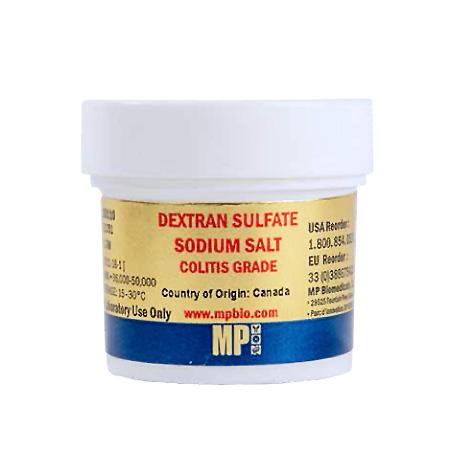
產(chǎn)品及服務(wù)
首頁 > 產(chǎn)品及服務(wù) > 代理品牌 > MP Biomedicals (ICN)


原廠連結(jié)
0216011001??? 1g?
0216011010?? 10g
0216011025?? 25g
0216011050?? 50g
0216011080? 100g
0216011090? 500g

- Highest sulfur content: 19%
- Highest chirality: +104° of specific rotation
- Lowest pH: 6.2 at 1% solution

Bamba?et al.?(2012) performed a comparative analysis of 3 different DSS preparations to examine the chemical and cytotoxic properties as well as severity of colitis.?
?
-
Crncec, I., et al. Induction of colorectal cancer in mice and histomorphometric evaluation of tumors. Methods Mol. Biol. 1267, 145–64 (2015).
-
Grill, J. et al. Intestinal E-cadherin Deficiency Aggravates Dextran Sodium Sulfate-Induced Colitis. Dig. Dis. Sci. 60, 895–902 (2015).
-
Huang, Z. et al. An orally administrated nucleotide-delivery vehicle targeting colonic macrophages for the treatment of inflammatory bowel disease. Biomaterials 48, 26–36 (2015).
-
Utrilla, M. P. et al. Pea (Pisum sativum L.) seed albumin extracts show anti-inflammatory effect in the DSS model of mouse colitis. Mol. Nutr. Food Res. 59, 807–19 (2015).
-
Zhang, Y., Brenner, M., Yang and TNBS-induced colitis in mice. Lab. Invest. 95, 480–90 (2015).
-
Sales-Campos, H. et al. Aedes aegypti salivary gland extract ameliorates experimental inflammatory bowel disease. Int. Immunopharmacol. 26, 13–22 (2015).
-
Belkind-Gerson, J. et al. Colitis induces enteric neurogenesis through a 5-HT4-dependent mechanism. Inflamm. Bowel Dis. 21, 870–8 (2015).
-
Hasby, E. et al. T regulatory cells and immunomodulation after Schistosoma mansoni egg antigen immunization in experimental model of inflammatory bowel disease. Cell. Immunol. 295, 67–76 (2015).
-
He, J. et al. NPC1L1 knockout protects against colitis-associated tumorigenesis in mice. BMC Cancer 15, 189 (2015).
-
Nakamura, S. et al. Erythropoietin attenuates intestinal inflammation and promotes tissue regeneration. Scand. J. Gastroenterol. 50, 1094–102 (2015).
-
Garrido-Mesa, J. et al. A new therapeutic association to manage relapsing experimental colitis: Doxycycline plus Saccharomyces boulardii. Pharmacol. Res. 97, 48–63 (2015).
-
Li, J. et al. Ternary polyplex micelles with PEG shells and intermediate barrier to complexed DNA cores for efficient systemic gene delivery. J. Control. Release 209, 77–87 (2015).
-
Nagy-Szakal, D. et al. Loss of n-6 fatty acid induced pediatric obesity protects against acute murine colitis. FASEB J. 29, 3151–9 (2015).
-
Wen, J. et al. The role of Th17/Treg balance and Th22 cell in the pathogenesis of DSS-induced colitis in mice. Eur. J. Inflamm. 13, 101–108 (2015).
-
Rauch, I. et al. Noncanonical Effects of IRF9 in Intestinal Inflammation: More than Type I and Type III Interferons. Mol. Cell. Biol. 35, 2332–43 (2015).
-
Saijo, H. et al. Microangiopathy triggers, and inducible nitric oxide synthase exacerbates dextran sulfate sodium-induced colitis. Lab. Invest. 95, 728–48 (2015).
-
Jain, U et al Regulation of Complement Activation Affects Colitis in Interleukin 10 Gene-Deficient Mice. Inflamm. Bowel Dis. 21, 1519–28 (2015).
-
Li, M. et al. Endomicroscopy Will Track Injected Mesenchymal Stem Cells in Rat Colitis Models. Inflamm. Bowel Dis. 21, 2068–77 (2015).
-
Zhang, J. et al. Ginsenosides Regulate PXR/NF-?B Signaling and Attenuate Dextran Sulfate Sodium-Induced Colitis. Drug Metab. Dispos. 43, 1181–9 (2015).
-
Gurav, A. et al. Slc5a8, a Na+-coupled high-affinity transporter for short-chain fatty acids, is a conditional tumour suppressor in colon that protects against colitis and colon cancer under low-fibre dietary conditions. Biochem. J. 469, 267–78 (2015).
-
Dai, X. et al. MicroRNA-193a-3p Reduces Intestinal Inflammation in Response to Microbiota via Down-regulation of Colonic PepT1. J. Biol. Chem. 290, 16099–115 (2015).
-
Yokoyama, S., et al. Impairment of skin barrier function via cholinergic signal transduction in a dextran sulphate sodium-induced colitis mouse model. Exp. Dermatol. 24, 779–84 (2015).
-
Reichmann, F. et al. Dextran sulfate sodium-induced colitis alters stress-associated behaviour and neuropeptide gene expression in the amygdala-hippocampus network of mice. Sci. Rep. 5, 9970 (2015).
-
Erickson, N. A. et al. The Goblet Cell Protein Clca1 (Alias mClca3 or Gob-5) Is Not Required for Intestinal Mucus Synthesis, Structure and Barrier Function in Naive or DSS-Challenged Mice. PLoS One 10, e0131991 (2015).
-
Wen, Y.-A. et al. Loss of PHLPP protects against colitis by inhibiting intestinal epithelial cell apoptosis. Biochim. Biophys. Acta 1852, 2013–23 (2015).
-
Cho, J. Y. et al. ß-Caryophyllene attenuates dextran sulfate sodium-induced colitis in mice via modulation of gene expression associated mainly with colon inflammation. Toxicol. Reports 2, 1039–1045 (2015).
-
Wu, J. et al. Glucagon-like peptide-2-loaded microspheres as treatment for ulcerative colitis in the murine model. J. Microencapsul. 32, 598–607 (2015).
-
Naeem, M. et al. Colon-targeted delivery of budesonide using dual pH- and time-dependent polymeric nanoparticles for colitis therapy. Drug Des. Devel. Ther. 9, 3789–99 (2015).
-
Vitali, R. et al. Dipotassium glycyrrhizate via HMGB1 or AMPK signaling suppresses oxidative stress during intestinal inflammation. Biochem. Pharmacol. 97, 292–9 (2015).
-
Pandurangan, A. et al.. Gallic acid attenuates dextran sulfate sodium-induced experimental colitis in BALB/c mice. Drug Des. Devel. Ther. 9, 3923–34 (2015).


